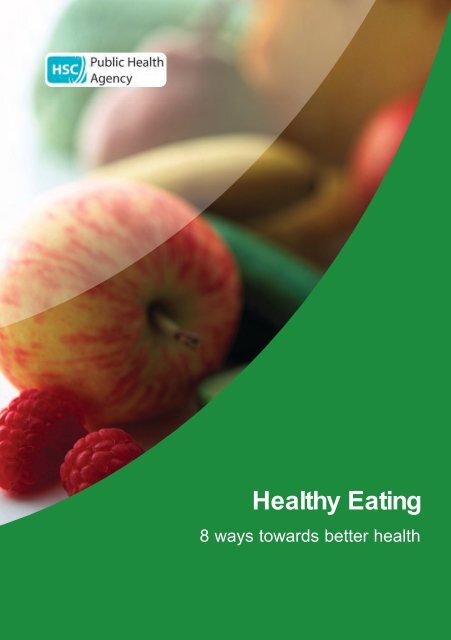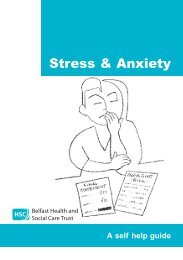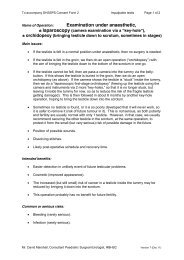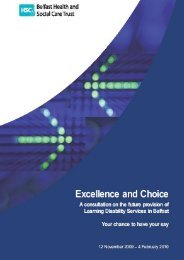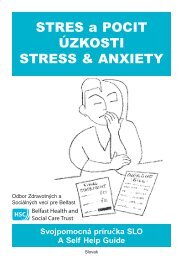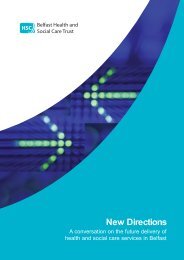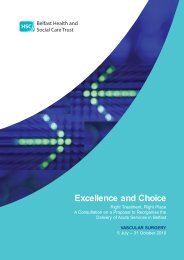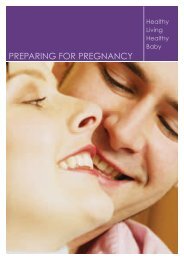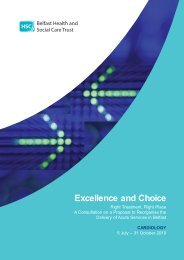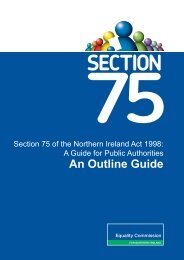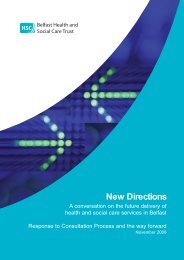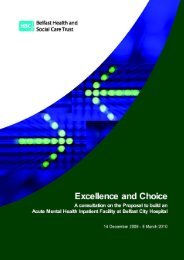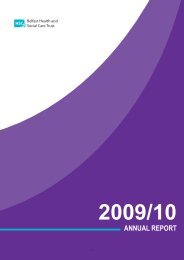Healthy Eating Booklet (pdf) - Belfast Health and Social Care Trust
Healthy Eating Booklet (pdf) - Belfast Health and Social Care Trust
Healthy Eating Booklet (pdf) - Belfast Health and Social Care Trust
Create successful ePaper yourself
Turn your PDF publications into a flip-book with our unique Google optimized e-Paper software.
<strong><strong>Health</strong>y</strong> <strong>Eating</strong><br />
8 ways towards better health
Name:<br />
Contact person :<br />
Contact number:<br />
2
8 Ways Towards Better <strong>Health</strong><br />
Depending on your present lifestyle you may need to make some<br />
changes. Here are some practical suggestions:<br />
1. Do not smoke or if you do smoke: get help to stop.<br />
2. Aim for a healthy weight.<br />
3. Take regular physical activity.<br />
4. Include plenty of fruit, vegetables <strong>and</strong> wholegrain foods in<br />
your diet.<br />
5. Eat less fat.<br />
6. Eat less sugar.<br />
7. Avoid salt <strong>and</strong> salty foods.<br />
8. Keep alcohol intake within limits advised.<br />
1. Where can I get help<br />
to quit smoking?<br />
Ask your doctor, nurse or pharmacist<br />
to put you in touch with a local ‘stop<br />
smoking’ service. Alternatively, you<br />
can speak to a specially trained<br />
counsellor by calling:<br />
Northern Irel<strong>and</strong> Smoking Cessation<br />
Helpline: T: 0800 858585<br />
Quitline: T: 0800 002200<br />
www.want2stop.info<br />
3
2. Aim for a healthy<br />
weight<br />
If we eat more than our body needs,<br />
we will gain weight. This is because<br />
we store any energy we don’t use up<br />
as fat. Even small amounts of extra<br />
energy from food <strong>and</strong> some drinks<br />
each day can gradually lead to weight<br />
gain.<br />
If you are worried about your weight<br />
ask your GP or a Registered Dietitian<br />
for advice.<br />
3. Staying Active<br />
This can help:-<br />
• Control weight<br />
• Lower blood pressure<br />
• Protect us from serious conditions<br />
such as heart disease, stroke,<br />
osteoporosis, diabetes <strong>and</strong> some<br />
cancers<br />
• Improve self confidence, making<br />
us look <strong>and</strong> feel better<br />
• Reduce stress, anxiety <strong>and</strong><br />
depression.<br />
Being more active is easier than you<br />
think. Begin by putting a little extra<br />
effort into things you do every day, e.g.<br />
park car further away, use stairs more<br />
often.<br />
Ideally everyone should take at least<br />
30 minutes of moderate physical<br />
activity most days of the week. This<br />
can be done in one go or split into<br />
sessions eg. 3 sessions of 10 minutes<br />
each or 2 sessions of 15 minutes<br />
each.<br />
4
Choose an activity that you enjoy <strong>and</strong><br />
is convenient for you, eg.<br />
• Walking, dancing, exercising at<br />
home to a DVD, cycling,<br />
swimming or aqua aerobics<br />
It is sometimes hard to get started so<br />
why not begin with one of the<br />
following:<br />
For more information about keeping<br />
active, including local walking groups,<br />
contact the <strong>Health</strong> Promotion<br />
Department in your <strong>Health</strong> <strong>and</strong> <strong>Social</strong><br />
<strong>Care</strong> <strong>Trust</strong>.<br />
Tip<br />
Regular physical activity has many<br />
benefits<br />
• Walking groups – meet weekly in<br />
a range of areas<br />
• <strong>Health</strong>wise – a 12 week tailored<br />
exercise programme delivered<br />
through leisure centres. Ask your<br />
GP or practice nurse for more<br />
information<br />
• If you find it difficult to be active<br />
because of health problems why<br />
not try chair based activity<br />
sessions<br />
• Ask a friend or family member to<br />
join you. Support <strong>and</strong><br />
encouragement can help keep<br />
you motivated.<br />
If you have a health problem or any<br />
worries about starting a new activity<br />
check with your GP first.<br />
5
4. How to Eat More<br />
Fibre<br />
Include:<br />
• High fibre breakfast cereals eg.<br />
Weetabix, Branflakes, Porridge or<br />
Shredded Wheat<br />
• Wholemeal, wholegrain, wheaten<br />
or granary bread<br />
• Fruit - fresh, frozen, tinned fruit in<br />
its own juice or dried fruit<br />
• Vegetables - fresh, frozen or<br />
tinned. Cook for a short time eg.<br />
boil or steam (8-10 mins) or eat<br />
raw as salads<br />
• Pulses eg. peas, beans <strong>and</strong> lentils<br />
can be used in soups, stews <strong>and</strong><br />
casseroles.<br />
One portion of fruit or vegetable is:<br />
• 1 slice of large fruit, eg. melon or<br />
pineapple<br />
• 1 medium sized fruit, eg. pear,<br />
banana or apple<br />
• 2 small fruits, eg. kiwi, m<strong>and</strong>arin<br />
oranges or plums<br />
• 3 heaped tablespoons of fruit<br />
salad or tinned fruit<br />
• 1 h<strong>and</strong>ful of very small fruit eg.<br />
grapes or strawberries<br />
• 1 glass of fruit juice (150ml) can<br />
only be counted as one portion a<br />
day even if more than this is<br />
consumed<br />
Diets rich in fruit <strong>and</strong> vegetables help<br />
protect against heart disease <strong>and</strong><br />
some cancers.<br />
Have at least five portions of fruit <strong>and</strong><br />
vegetables daily. Choose a wide<br />
variety of different coloured fruit <strong>and</strong><br />
vegetables for a range of vitamins <strong>and</strong><br />
minerals.<br />
6
• 3 heaped tablespoons of cooked<br />
vegetables<br />
• 1 dessert bowl of salad<br />
• 1 heaped tablespoon of dried fruit<br />
(best taken at mealtimes <strong>and</strong> not<br />
between meals to protect teeth).<br />
Include at least 6-8 glasses (1.2 litres)<br />
of fluids (non sugary) daily eg. water,<br />
tea, or coffee.<br />
Tip<br />
Eat a variety of foods rich in fibre<br />
daily<br />
7
5. How to Eat Less Fat<br />
Cut down on the total amount of fat<br />
you eat, especially saturated fat<br />
1 Trim visible fat, remove skin from<br />
chicken <strong>and</strong> turkey <strong>and</strong> drain off<br />
fat from cooked meat.<br />
2 Grill, boil, bake, stew, steam or<br />
microwave food instead of frying.<br />
Limit fried foods such as chips,<br />
sauté potatoes <strong>and</strong> fried meats.<br />
3 Use all fats <strong>and</strong> oils sparingly.<br />
Avoid adding fats to food as much<br />
as possible, eg. avoid adding<br />
butter/margarine to vegetables or<br />
potatoes <strong>and</strong> use sparingly on<br />
bread.<br />
4 Choose a spread or cooking oil<br />
labelled “high in<br />
monounsaturates” eg. rapeseed<br />
or olive , or “high in<br />
polyunsaturates” eg. sunflower,<br />
soya or corn oil.<br />
8
5 Use lower fat alternatives, eg.<br />
skimmed or semi-skimmed<br />
milk <strong>and</strong> lower fat cheeses such<br />
as Cottage Cheese, Edam,<br />
Gouda, Mozzarella or reduced fat<br />
Cheddar.<br />
6 Eat fewer fat-rich foods eg. pastry,<br />
pies, cream, cakes, biscuits,<br />
chocolate, creamy sauces <strong>and</strong><br />
meat products eg. sausage rolls,<br />
sausages.<br />
7 Try to buy leaner cuts of meat.<br />
Use smaller quantities of meat<br />
<strong>and</strong> include chicken or turkey. Fill<br />
up with vegetables, potatoes,<br />
peas, beans, lentils, rice, pasta<br />
<strong>and</strong> bread.<br />
8 Include fish at least twice a week<br />
<strong>and</strong> make one of these an oily<br />
fish, eg. mackerel, herring,<br />
sardines or salmon.<br />
6. How to Eat Less<br />
Sugar<br />
Too much sugar <strong>and</strong> sugary foods can<br />
lead to weight gain <strong>and</strong> tooth decay.<br />
• Avoid sugary snacks such as<br />
cakes, biscuits <strong>and</strong> sweetened<br />
drinks between meals. Where<br />
possible limit these to mealtimes.<br />
Choose fruit as a snack instead<br />
• Have tea or coffee without sugar<br />
or, if needed use an artificial<br />
sweetener such as Hermesetas,<br />
C<strong>and</strong>erel or Sweetex<br />
• Drinks to take between meals<br />
include water, tea <strong>and</strong> coffee<br />
without sugar. Fruit juices, sugarfree<br />
diet drinks <strong>and</strong> low sugar<br />
squashes are acidic <strong>and</strong> can<br />
cause dental erosion. These are<br />
best taken well diluted where<br />
possible <strong>and</strong> limited to mealtimes.<br />
Water is best!<br />
IMPORTANT<br />
Cutting down on fat will reduce your<br />
calorie intake <strong>and</strong> help you lose<br />
weight. If you don’t need to lose<br />
weight, eat extra bread, potatoes,<br />
pasta <strong>and</strong> rice.<br />
9
7. How to Eat Less Salt<br />
<strong>Eating</strong> too much salt can cause high<br />
blood pressure which can increase<br />
your risk of heart disease.<br />
• Adults should have no more than<br />
6 grams of salt daily<br />
• Try not to add salt at the table <strong>and</strong><br />
use sparingly during cooking<br />
• Use pepper, herbs <strong>and</strong> spices to<br />
flavour food instead of salt<br />
• Avoid salt substitutes such as<br />
Losalt, Ruthamol or Selora<br />
• Eat fewer crisps, nuts, cured or<br />
smoked meats <strong>and</strong> fish, tinned<br />
<strong>and</strong> packet foods<br />
• If using tinned or processed foods<br />
choose reduced salt or no added<br />
salt varieties.<br />
Tip<br />
Try to reduce salt. Use herbs <strong>and</strong><br />
spices to flavour food.<br />
10
8. Drink Sensibly<br />
Regular heavy drinking can damage<br />
the liver, heart, brain <strong>and</strong> stomach. It<br />
can also cause some cancers eg. of<br />
the mouth <strong>and</strong> throat <strong>and</strong> increase the<br />
risk of liver, stomach <strong>and</strong> breast<br />
cancers. Alcohol is high in calories so<br />
cutting down could help you control<br />
your weight.<br />
It is important not to drink too much in<br />
a single day.<br />
Recommended limits for alcohol:<br />
Men: No more than 3 - 4 units daily.<br />
Women: No more than 2 - 3 units<br />
daily.<br />
If you regularly drink more than this<br />
there is an increased risk to your<br />
health.<br />
Binge drinking is:<br />
• A man drinking 10 or more units<br />
of alcohol in one session (as little<br />
as 5 pints of normal strength<br />
beer)<br />
Units of alcohol in drinks:<br />
• Pint of lager = 2½ units<br />
• Pint of premium lager = 3 units<br />
• ½ pint cider = 1½ units<br />
• Northern Irel<strong>and</strong> pub measure of<br />
spirits = 1½ units<br />
• Alcopops/ready mixed drink = 1½<br />
units<br />
• Bottle of lager = 1½ units<br />
• Pint of stout = 2½ units<br />
• Can of extra strong lager = 4½<br />
units<br />
• Small bottle of wine = 2¼ units<br />
• Bottle of wine = 9 units.<br />
Try to spread your alcohol intake over<br />
the week <strong>and</strong> include some alcohol<br />
free days.<br />
• A woman drinking 7 or more units<br />
in one session (as little as 3 small<br />
glasses of wine <strong>and</strong> 2 vodkas)<br />
11
Sample meal plan<br />
<br />
Breakfast<br />
Fruit or unsweetened fruit juice<br />
High-fibre cereal or porridge with skimmed or semi-skimmed milk<br />
Wholemeal/Wholegrain toast or bread<br />
Mid-morning<br />
Tea or coffee<br />
Light meal<br />
Lean meat, chicken, fish, reduced fat cheese, egg or<br />
pulses eg. peas, beans, lentils,<br />
vegetables or salad<br />
Wholemeal / Wholegrain bread or boiled / baked potatoes, pasta or rice<br />
Fruit, low fat yoghurt or fromage frais<br />
Mid-afternoon<br />
Tea or coffee<br />
Main meal<br />
Lean meat, chicken, fish, reduced fat cheese, egg or pulses<br />
Vegetables or salad<br />
Wholemeal / wholegrain bread or boiled / baked potatoes, pasta or rice<br />
Fruit, low fat yoghurt or fromage frais<br />
Bed-time<br />
Tea or coffee<br />
12
Suitable snacks<br />
Food labelling<br />
Fruit, vegetable sticks, bread, toast,<br />
bowl of unsweetened wholegrain<br />
cereal, “Diet”/ “Lite” yoghurt.<br />
Tea or coffee with skimmed or<br />
semi-skimmed milk.<br />
Water or well diluted squash or fruit<br />
juice.<br />
If you want to eat a healthy diet, one<br />
of the key things you can do is to try to<br />
cut down on fat (especially saturated<br />
fat), salt <strong>and</strong> added sugars. When you<br />
are checking food labels to choose<br />
which products to buy, traffic light<br />
colours can help you make that choice<br />
quickly <strong>and</strong> easily.<br />
Use this easy guide to make<br />
healthier choices while<br />
shopping.<br />
What the colours mean:<br />
RED means HIGH indicating that the<br />
food is high in fat, sugars or salt.<br />
It’s fine to eat this food occasionally,<br />
but think about how often you choose<br />
it <strong>and</strong> how much of it you eat.<br />
AMBER means MEDIUM making it an<br />
OK choice. Use in moderation.<br />
Going for green is even better!<br />
GREEN means it is LOW which<br />
makes it a healthier choice.<br />
13
USING TRAFFIC LIGHTS<br />
to make healthier choices<br />
Per 100g of<br />
food<br />
Fat<br />
content<br />
Saturated fat<br />
content<br />
Sugar<br />
content<br />
Salt<br />
content<br />
Sodium<br />
content<br />
High Over 20g Over 5g Over 15g Over 1.5g Over 0.6g<br />
Medium<br />
Between<br />
3g - 20g<br />
Between<br />
1.5g - 5g<br />
Between<br />
5g - 15g<br />
Between<br />
0.3g - 1.5g<br />
Between<br />
0.1g - 0.6g<br />
Low<br />
3g<br />
or less<br />
1.5g<br />
or less<br />
5g<br />
or less<br />
0.3g<br />
or less<br />
0.1g<br />
or less<br />
Useful websites<br />
Eat well - www.eatwell.gov.uk<br />
Food St<strong>and</strong>ards Agency - www.food.gov.uk<br />
British Dietetic Association - www.bda.uk.com<br />
5 a day - www.5aday.nhs.uk<br />
HSC Public <strong>Health</strong> Agency - www.enjoyhealthyeating.info<br />
14
Compiled by the Community Nutrition <strong>and</strong> Dietetic Service<br />
Produced by CRIS<br />
Communication Resources & Information Services<br />
Dorothy Gardiner Building<br />
Knockbracken <strong>Health</strong>care Park<br />
Saintfield Road, <strong>Belfast</strong>, BT8 8BH<br />
T 028 9056 3770<br />
BT08-107<br />
January 2010


